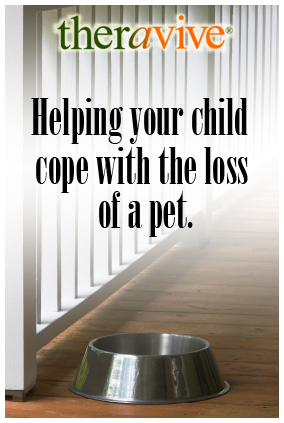 Children will experience many losses over their lifetimes. Some early losses may seem insignificant to adults who are more seasoned in their coping styles. However, it is important not to underestimate the impact of early losses on children, including pets.
Children will experience many losses over their lifetimes. Some early losses may seem insignificant to adults who are more seasoned in their coping styles. However, it is important not to underestimate the impact of early losses on children, including pets.
Many children grow up with pets in their daily lives. A beloved cat or dog may be among their earliest and fondest memories. The love that is shared between animals and children is truly the purest form of unconditional love. It can be quite difficult for a child to lose these trusted companions.
Very young children do not understand that death is permanent. They may look for their beloved pet and wait for the pet to return. It is not until a child is around 7-years-old that s/he begins to understand that death is permanent. However, they tend to think death is reserved for only the very old or very sick.
Many indoor pets live to be older, and their aging is obvious to those who care for them. Kids also hear adults talk about these issues, so they pick up on our thoughts and feelings about the health, wellbeing and longevity of our pets. As a result, your elementary age child may recognize that their pet is vulnerable to death as the pet ages.
Pets often go to extreme measures to keep their humans from knowing when they are sick or in pain. In those cases, a dog or cat of any age may look and act perfectly normal until just hours before death. This may be more difficult for children (and adults) to handle. Losses that seem to come too soon or without any warning are usually the hardest for everyone.
There is some speculation that some dogs and cats ‘wander off to die’ away from home. Some believe this is a pack behavior in dogs, as the scent of a dead animal would attract predators. Cats are not pack animals, but reportedly some cats also do this at the time of death. Should this happen, your child may be confused and anxious. It would be important to look for the beloved pet to help your child cope with the loss.
Children fill in missing details and often extrapolate from their ‘little child’ thoughts. For example, if parents allow the beloved pet to go missing without looking for him/her, will they do the same should the child be lost? For the same reason, it is not a good idea to lie to children about the death of pet by saying the animal just ran away.
A Word About Emotionally Sensitive Children and Teens
It should be noted that some children are naturally more emotionally sensitive than others. It is believed that about 20% of the population are considered highly sensitive. These children may be more deeply affected by real or perceived loss than others.
We all know adults who have these highly sensitive traits – they are the people who cry easily and feel things very deeply. It seems they are more attuned to things around them. Emotionally sensitive children must learn how to manage their emotions, as well do. This requires that parents be patient and allow them to be themselves. They may react quite differently from your other children, requiring more time to process emotions. These children may be sensitive to issues that others are not affected by.
Coping with Pet Loss
- When possible, let the child say goodbye to a pet that is going to be euthanized. Explain why it is time for the pet to go and that euthanasia is a humane way to ease the pet’s suffering. Be sure that you only give as much detail as appropriate for the child based on his/her age and development.
- Help your child make a small gift or card to express his/her feelings.
- If a pet is injured, consider the emotional impact of seeing the pet’s injured body and use your judgment. If you think it would be better for your child’s memories of the pet to be before the accident or injury, follow your judgment.
- Have a ritual of some kind, whether a burial or memorial, to allow the child to say goodbye and experience a sense of closure.
- Celebrate! Make a scrapbook or collage of photos and relive the fond memories you’ve enjoyed with your beloved pet.
- Let your child express his/her feelings. Ask them in the upcoming weeks and months how they are feeling about the loss. Remind him/her of fond memories at the appropriate times.
- Don’t rush out to get a ‘replacement pet’. Give it some time and make the decision about your next pet as a family. It is important for children to understand that pets and people are not interchangeable. This is another way children extrapolate in their young minds – ‘if something happened to me, would mom and dad simply go out and get another child?’.
________________________________________________________________________________________________________
"Coping with Pet Loss." Help Guide. N.p., n.d. Web. 27 Aug. 2013.
"Children and Pet Loss." Children and Pet Loss. Association for Pet Loss and Bereavement, n.d. Web. 27 Aug. 2013.
About the Author
 LuAnn Pierce, LCSW
LuAnn Pierce, LCSWI am a clinical social worker, therapist and writer. Currently, I offer online therapy and coaching services to people in Colorado and Wyoming. As a provider for the CO Department of Vocational Rehabilitation and the National MS Society, my expertise in counseling people who have disabilities and chronic illness is considerable. I have written for About.com, DailyRx.com, Theravive.com, GoodTherapy.org, SelfHelpMagazine.com and contribute to several other online health and mental health sites.
Office Location:
19th & Dahlia
Denver, Colorado
80220
United States
Phone: 303-910-2425
Contact LuAnn Pierce, LCSW
Professional Website:
http://HireASocialWorker.com